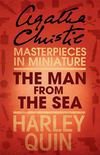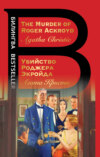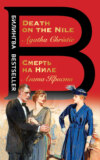Loe raamatut: «The Man from the Sea: An Agatha Christie Short Story»
The Man from the Sea
A Short Story
by Agatha Christie

Copyright
Published by HarperCollinsPublishers Ltd 1 London Bridge Street London SE1 9GF
First published 2008
Copyright © 2008 Agatha Christie Ltd.
Cover design © HarperCollinsPublishers 2013
Agatha Christie asserts the moral right to be identified as the author of this work
A catalogue copy of this book is available from the British Library
This novel is entirely a work of fiction. The names, characters and incidents portrayed in it are the work of the author’s imagination. Any resemblance to actual persons, living or dead, events or localities is entirely coincidental
All rights reserved under International and Pan-American Copyright Conventions. By payment of the required fees, you have been granted the nonexclusive, nontransferable right to access and read the text of this e-book on-screen. No part of this text may be reproduced, transmitted, downloaded, decompiled, reverse engineered, or stored in or introduced into any information storage and retrieval system, in any form or by any means, whether electronic or mechanical, now known or hereinafter invented, without the express written permission of HarperCollins e-books.
HarperCollinsPublishers has made every reasonable effort to ensure that any picture content and written content in this ebook has been included or removed in accordance with the contractual and technological constraints in operation at the time of publication.
Ebook Edition © OCTOBER 2013 ISBN: 9780007526864
Version: 2017-04-17
Contents
Cover
Title Page
Copyright
The Man from the Sea
Related Products
About the Publisher
The Man from the Sea
‘The Man from the Sea’ was first published in Britannia & Eve, October 1929.
Mr Satterthwaite was feeling old. That might not have been surprising since in the estimation of many people he was old. Careless youths said to their partners: ‘Old Satterthwaite? Oh! he must be a hundred – or at any rate about eighty.’ And even the kindest of girls said indulgently, ‘Oh! Satterthwaite. Yes, he’s quite old. He must be sixty.’ Which was almost worse, since he was sixty-nine.
In his own view, however, he was not old. Sixty-nine was an interesting age – an age of infinite possibilities – an age when at last the experience of a lifetime was beginning to tell. But to feel old – that was different, a tired discouraged state of mind when one was inclined to ask oneself depressing questions. What was he after all? A little dried-up elderly man, with neither chick nor child, with no human belongings, only a valuable Art collection which seemed at the moment strangely unsatisfying. No one to care whether he lived or died …
At this point in his meditations Mr Satterthwaite pulled himself up short. What he was thinking was morbid and unprofitable. He knew well enough, who better, that the chances were that a wife would have hated him or alternatively that he would have hated her, that children would have been a constant source of worry and anxiety, and that demands upon his time and affection would have worried him considerably.
‘To be safe and comfortable,’ said Mr Satterthwaite firmly – that was the thing.
The last thought reminded him of a letter he had received that morning. He drew it from his pocket and re-read it, savouring its contents pleasurably. To begin with, it was from a Duchess, and Mr Satterthwaite liked hearing from Duchesses. It is true that the letter began by demanding a large subscription for charity and but for that would probably never have been written, but the terms in which it was couched were so agreeable that Mr Satterthwaite was able to gloss over the first fact.
So you’ve deserted the Riviera, wrote the Duchess. What is this island of yours like? Cheap? Cannotti put up his prices shamefully this year, and I shan’t go to the Riviera again. I might try your island next year if you report favourably, though I should hate five days on a boat. Still anywhere you recommend is sure to be pretty comfortable – too much so. You’ll get to be one of those people who do nothing but coddle themselves and think of their comfort. There’s only one thing that will save you, Satterthwaite, and that is your inordinate interest in other people’s affairs …
As Mr Satterthwaite folded the letter, a vision came up vividly before him of the Duchess. Her meanness, her unexpected and alarming kindness, her caustic tongue, her indomitable spirit.
Spirit! Everyone needed spirit. He drew out another letter with a German stamp upon it – written by a young singer in whom he had interested himself. It was a grateful affectionate letter.
‘How can I thank you, dear Mr Satterthwaite? It seems too wonderful to think that in a few days I shall be singing Isolde …’
A pity that she had to make her début as Isolde. A charming, hardworking child, Olga, with a beautiful voice but no temperament. He hummed to himself. ‘Nay order him! Pray understand it! I command it. I, Isolde.’ No, the child hadn’t got it in her – the spirit – the indomitable will – all expressed in that final ‘Ich Isoldé!’
Well, at any rate he had done something for somebody. This island depressed him – why, oh! why had he deserted the Riviera which he knew so well and where he was so well known? Nobody here took any interest in him. Nobody seemed to realize that here was the Mr Satterthwaite – the friend of Duchesses and Countesses and singers and writers. No one in the island was of any social importance or of any artistic importance either. Most people had been there seven, fourteen, or twenty-one years running and valued themselves and were valued accordingly.
With a deep sigh Mr Satterthwaite proceeded down from the Hotel to the small straggling harbour below. His way lay between an avenue of bougainvillaea – a vivid mass of flaunting scarlet, that made him feel older and greyer than ever.
‘I’m getting old,’ he murmured. ‘I’m getting old and tired.’
He was glad when he had passed the bougainvillaea and was walking down the white street with the blue sea at the end of it. A disreputable dog was standing in the middle of the road, yawning and stretching himself in the sun. Having prolonged his stretch to the utmost limits of ecstasy, he sat down and treated himself to a really good scratch. He then rose, shook himself, and looked round for any other good things that life might have to offer.
There was a dump of rubbish by the side of the road and to this he went sniffing in pleasurable anticipation. True enough, his nose had not deceived him! A smell of such rich putrescence that surpassed even his anticipations! He sniffed with growing appreciation, then suddenly abandoning himself, he lay on his back and rolled frenziedly on the delicious dump. Clearly the world this morning was a dog paradise!
Tiring at last, he regained his feet and strolled out once more into the middle of the road. And then, without the least warning, a ramshackle car careered wildly round the corner, caught him full square and passed on unheeding.
The dog rose to his feet, stood a minute regarding Mr Satterthwaite, a vague dumb reproach in his eyes, then fell over. Mr Satterthwaite went up to him and bent down. The dog was dead. He went on his way, wondering at the sadness and cruelty of life. What a queer dumb look of reproach had been in the dog’s eyes. ‘Oh! World,’ they seemed to say. ‘Oh! Wonderful World in which I have trusted. Why have you done this to me?’
Mr Satterthwaite went on, past the palm trees and the straggling white houses, past the black lava beach where the surf thundered and where once, long ago, a well-known English swimmer had been carried out to sea and drowned, past the rock pools were children and elderly ladies bobbed up and down and called it bathing, along the steep road that winds upwards to the top of the cliff. For there on the edge of the cliff was a house, appropriately named La Paz. A white house with faded green shutters tightly closed, a tangled beautiful garden, and a walk between cypress trees that led to a plateau on the edge of the cliff where you looked down – down – down – to the deep blue sea below.
It was to this spot that Mr Satterthwaite was bound. He had developed a great love for the garden of La Paz. He had never entered the villa. It seemed always to be empty. Manuel, the Spanish gardener, wished one good-morning with a flourish and gallantly presented ladies with a bouquet and gentlemen with a single flower as a buttonhole, his dark face wreathed in smiles.
Sometimes Mr Satterthwaite made up stories in his own mind about the owner of the villa. His favourite was a Spanish dancer, once world-famed for her beauty, who hid herself here so that the world should never know that she was no longer beautiful.
He pictured her coming out of the house at dusk and walking through the garden. Sometimes he was tempted to ask Manuel for the truth, but he resisted the temptation. He preferred his fancies.
After exchanging a few words with Manuel and graciously accepting an orange rosebud, Mr Satterthwaite passed on down the cypress walk to the sea. It was rather wonderful sitting there – on the edge of nothing – with that sheer drop below one. It made him think of Tristan and Isolde, of the beginning of the third act with Tristan and Kurwenal – that lonely waiting and of Isolde rushing up from the sea and Tristan dying in her arms. (No, little Olga would never make an Isolde. Isolde of Cornwall, that Royal hater and Royal lover …) He shivered. He felt old, chilly, alone … What had he had out of life? Nothing – nothing. Not as much as that dog in the street …
Tasuta katkend on lõppenud.




















